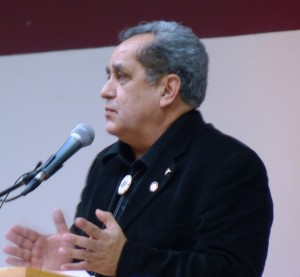
Outgoing Sealaska Board Chairman Albert Kookesh addresses Native leaders during a 2011 issues forum. (Ed Schoenfeld/CoastAlaska)
Sealaska board chair Albert Kookesh has vowed to back the Sitka Tribe of Alaska should it decide to sue the state over Sitka Sound sac-roe herring fishery.
At a meeting of tribal leaders in Sitka last week, Kookesh said, “I’m the chairman of the board of Sealaska Corporation. I told Sitka Tribe 2 or 3 years ago: you guys file suit, we’ll be there. And I’ll make the commitment to you right now. I’m still the chairman of the board of Sealaska. If you file suit on the herring fishery, we’ll be there. Our lawyers will be there. Our money will be there.”
Kookesh announced last month (January) that he will step down as Sealaska board chairman in June, but he plans to remain on the panel as a regular member.
Sitka’s Alaska Native Brotherhood hosted the meeting, which was intended to rally Native organizations around protecting the subsistence lifestyle.
Kookesh sat silent until near the end of the meeting. “Herring fishing in Sitka. You guys are the front line people for that,” said Kookesh. “We know that I live in Angoon. We don’t have herring roe there. We depend on this fishery to get our herring eggs. We depend on you guys.”
For millennia, Sitka’s tribal citizens have harvested herring roe on hemlock branches submerged in the ocean during spawning. The Tribe is concerned that the commercial fishing fleet is over- fishing herring, and threatening their traditional resource and practice.
The commercial sac-roe herring fishery came under state management in the mid-1960s. The egg sacs, which are stripped from females prior to spawning, are a delicacy in Japan and some other parts of Asia.
Kookesh points to Sitka’s herring fishery as one example of many across the state where the state government is indifferent to traditional harvesting practices.
“To me the reality is we need to elect somebody who is sympathetic to the Native community, “said Kookesh. “And is sympathetic to a subsistence way of life and that’s another Native.”
Kookesh urged the attendees to make it their mission to elect a Native governor, and cited the election of Senator Lisa Murkowski as a testament to the collective strength of Alaska Natives. The Native vote is believed to have played a significant role in Murkowski’s 2012 write-in election victory.































